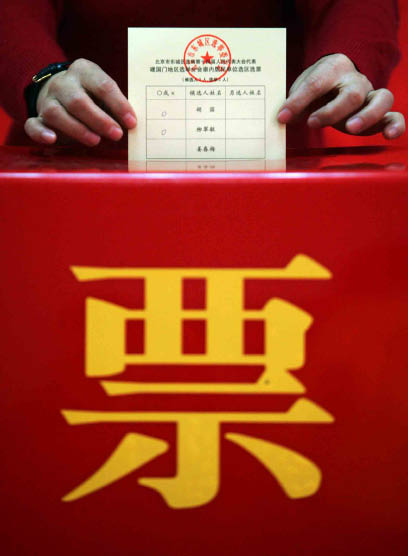Political Restructuring – An Arrow Poised for Flight
By WANG CHANGJIANG
CHINA’s reforms have reached the “make or break” stage wherein issues of great profundity that make high demands on China’s political system have appeared. The call for escalated political restructuring has grown louder, both within the Communist Party of China and among the general public. The 18th CPC National Congress was consequently a hotly anticipated event.
 |
| In November 2006, more than eight million Beijingers cast their votes for the election of people’s congress delegates at the district, county, town and township levels. |
Political Restructuring Imperative
Why was it that political restructuring took center stage at talks held on the eve of the national congress? As China’s reforms proceed they expose deeper social conflicts that are ultimately attributable to faults in the political system. Changes to it in efforts to find solutions, therefore, are inevitable.
Such reforms are neither the pre-set mission nor subjective decision of any individual. The country’s three-decade-long high-speed economic growth has fostered a growing appetite for democracy. It is logical that, after economic development has reached a certain point, the economic needs of the people take second place in their priorities to those of a good living environment, high quality of life, security, dignity and all-round contentment. As these needs cannot be met through individual efforts they fall to the government. People consequently have higher expectations of the political system and of government performance. The matters at hand, therefore, are not those of livelihood or economic growth but of political procedure, or of a greater extent of democratic participation in the composition of government, policy making and administration – issues that cannot be solved by GDP growth alone.
Recent mass incidents such as those in Wukan Village of Guangdong Province, in Qidong City of Jiangsu Province and in Shifang City of Sichuan Province all demonstrate the public’s desire for political participation. Although triggered by separate events they have a common origin – that of the failure of the existing political system to offer an appropriate platform for orderly participation of the masses and the resultant overspill into mass activities. That there is a higher incidence of such incidents in the better-off eastern provinces is notable; it highlights the gap between the progress of political restructuring and public demands for democratic development.
As the ruling party of a country exercises state power it is hence expected to take responsibility for all domestic events. This is particularly so in China, where the CPC is the sole ruling party. Intra-party reforms, therefore, are at the core of political restructuring. To be more specific, promoting democracy within the CPC is a key element of China’s political restructuring.

